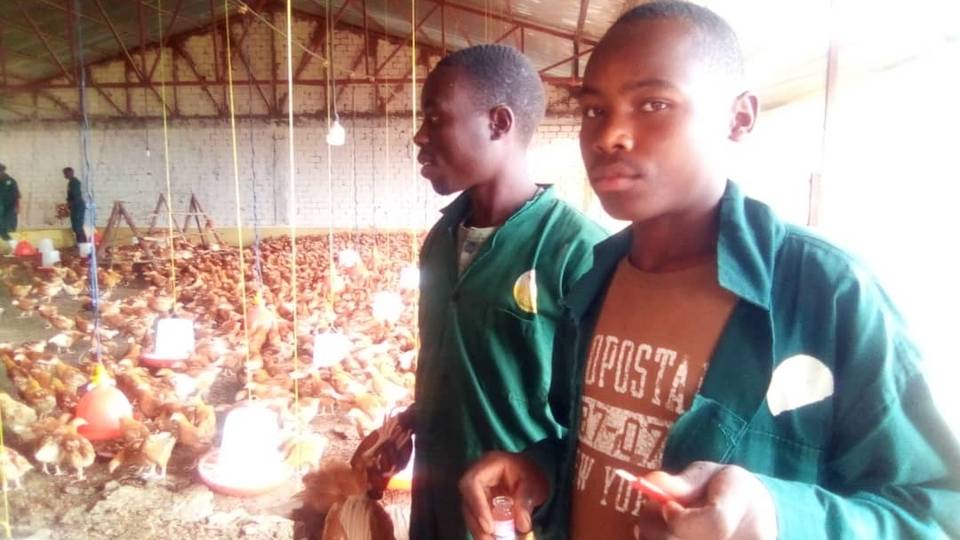Sport
Dollar
38,1396
0.3 %Euro
43,6409
0.05 %Gram Gold
4.078,1200
0.36 %Quarter Gold
6.720,2300
0 %Silver
39,9300
0.41 %This Kigali-based farm plays a role in Rwanda's goal of food self-sufficiency, employing dozens of young people and aiming to put chicken within the reach of common people by keeping prices stable.

By Firmain Eric Mbadinga
Unless someone is a vegetarian or allergic to it, what's not to go cock-a-hoop about chicken? Grilled, baked or braised, chicken remains an easy choice of protein in most diets and one of the most-favoured everyday foods to find their way to dining tables worldwide.
Some studies show that by 2027, chicken will surpass all other foods to become the world's leading choice of nutrition, with 117 million tonnes of meat available to meet the growing demand.
In Rwanda, too, people love their chicken.
In this nation of 14 million residents, which is severely impacted by the depredations of climate change like flooding and drought, ensuring the availability of poultry products, including broiler chicken, poses a significant challenge for those involved in the sector.
Between June and October 2024, abnormally high rainfall in the region caused flooding and landslides, claiming scores of lives and destroying homes and crops.
Many agro-pastoralists suffered heavy losses due to large-scale poultry deaths.
Prior to the floods, this industry was already grappling with the challenge of addressing a trade deficit, which was evident in the cost to consumers.
In Rwanda, the price of a kilo of broiler chicken in the retail market goes upwards of US $5, which already makes it unaffordable for a sizeable section of the population.
No wonder that in the Land of a Thousand Hills, per capita poultry consumption is estimated to be barely more than a kilo annually.

Farm to table
So, how do households that need protein in their diets get by when availability is constrained and prices soar?
Enter Michel Christophe Mbadinga, a career diplomat from Gabon willing to embrace the uncertainty of the business environment and provide a feasible solution to the problem.
In 2022, Michel Christophe launched a chicken farm on the outskirts of Kigali, the country's capital.
The venture, called Village Chiken, marked the realisation of a decade-old dream for the former civil servant.
Initially, the farm's activities consisted of raising chickens for egg production. A year later, Michel Christophe began rearing broiler chickens for consumption. Since the latter take much less time than the first to be ready for the market, the business took off.
Operating in a dynamic business environment helped, too.
"I have to acknowledge that the local authorities made it easy for me, knowing that this large-scale investment would create jobs for local youth. Another local need met by this farm is a regular supply of poultry products, particularly broiler chickens. When there are enough chickens, prices remain stable," the entrepreneur tells TRT Afrika.
Michel Christophe's farm was fortunate to be unaffected by the recent floods in Rwanda.
"Our farm is at a high altitude. Being on mountainous terrain, we haven't been impacted by the abundant water flow," he says. "Since prices have soared to such an extent that local people are struggling, there's an opportunity for us to fulfil the needs of consumers at reasonable costs."
Local employment
Michel Christophe recruited around ten young Rwandans to develop the farm. The workforce includes five breeders, a veterinarian, and some non-permanent workers. They are responsible for the flock's health, nutrition, and hygiene.

In terms of equipment, the farm has 500 drinking troughs and as many for feeding. It also has three tanks from which 5,000 litres of water are used daily to produce 15,000 chickens every three days.
After months of hand-plucking, Village Chiken recently acquired a modern plucking machine. The farm aims to produce 30,000 chickens by the end of the year.
All these efforts and investments are reflected in the price of chicken.
Chicken from the farm is sold at 2,500-3,500 CFA ($4.2-5.6) a kilo. "I usually produce to order, covering part of the national market. I now also export to countries like Congo-Kinshasa, where I deliver tonnes of chicken," Michel Christophe tells TRT Afrika.
Village Chiken sees its sales peak during festive periods such as Easter and Christmas.
Michel Christophe knows it's a challenging business that requires him to be patient, rigorous, and meticulous in how he runs the farm.
In chicken farming, the slightest bacterium can lead to epizootics, culminating in a rapid spread of disease.
Village Chiken has managed to avoid these pitfalls so far, thanks to Michel Christophe's philosophy of being consistent with the standards he has set for the farm.
➤Click here to follow our WhatsApp channel for more stories.
Comments
No comments Yet




















Comment